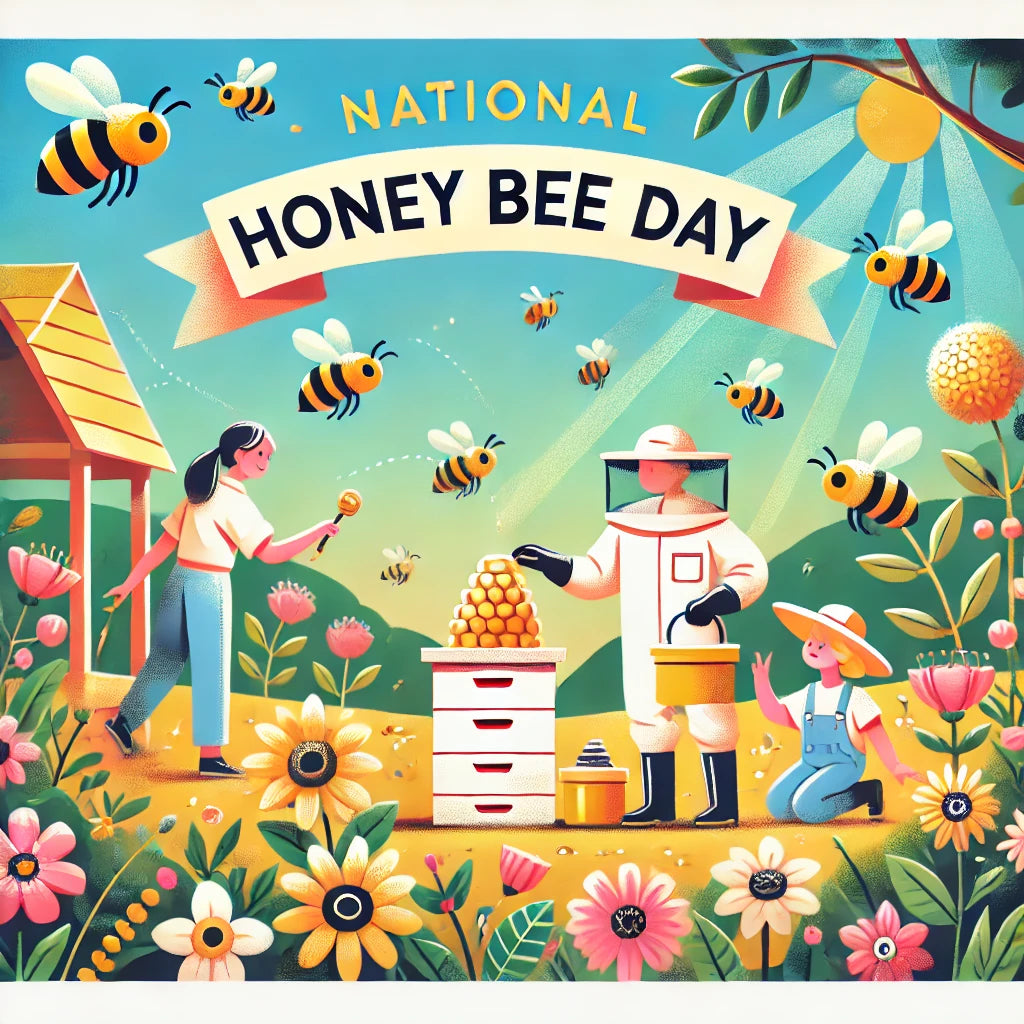Every year, National Honey Bee Awareness Day reminds us of the incredible role honeybees play in our lives. From pollinating crops to producing honey, these tiny creatures are essential for maintaining our ecosystems and food supply. But honeybees face many threats, including habitat loss, pesticides, and disease.
This day is an opportunity to celebrate their contributions and learn how to help them thrive. In this guide, you’ll discover why honeybees are vital, how to support them, and why their survival impacts us all.
The Origins of National Honey Bee Awareness Day
National Honey Bee Awareness Day started as a grassroots effort by beekeepers to highlight the importance of honeybees. First recognized in 2009, this day emphasizes the need for honeybee conservation and celebrates the beekeeping community. It’s a day for everyone—beekeepers, farmers, and everyday individuals—to come together to support honeybee populations.
Through educational programs, hive demonstrations, and local events, National Honey Bee Day helps raise awareness about the challenges honeybees face and inspires collective action.
Why Are Honeybees So Vital to Agriculture?
Honeybees are the backbone of agriculture, pollinating around 80% of all flowering crops. Without honeybees, fruits, vegetables, nuts, and even coffee would struggle to grow. This makes their role in food production irreplaceable.
When you learn why honeybees are vital to agriculture, you’ll realize their impact goes far beyond honey production. Pollination ensures genetic diversity in plants, resulting in higher yields and better quality produce. Farmers rely on honeybees to maintain stable food supplies, making their conservation critical for both local and global agriculture.
The Life Cycle of Bees: A Lesson in Teamwork
Honeybees thrive because of their structured social order and unique life cycle of bees. From egg to adult, each stage plays a vital role in the hive's productivity. Understanding this life cycle can help you appreciate how delicate their existence is and why they need our help.
- Egg Stage: The queen lays thousands of eggs daily, ensuring a constant supply of new bees.
- Larva Stage: Worker bees feed the larvae a diet of royal jelly or bee bread, preparing them for their adult roles.
- Pupa Stage: Bees undergo metamorphosis, emerging as workers, drones, or queens.
- Adult Stage: Adult bees take on specialized tasks like foraging, guarding the hive, or caring for the queen.
Every bee contributes to the hive's success, and protecting them ensures this intricate cycle continues.
How to Start a Bee Farm and Support Local Pollinators
Starting a bee farm is one of the most rewarding ways to support honeybees. Learning how to start a bee farm can help you contribute directly to their conservation while enjoying benefits like fresh honey and wax. Here’s what you need to begin:
- Learn the Basics: Research beekeeping practices, local regulations, and hive setup requirements.
- Get the Right Equipment: You’ll need hives, protective gear, and tools like smokers.
- Choose a Location: Pick an area rich in flowers and free from pesticide use.
- Provide Support: Feed bees during shortages and protect them from pests using beetle traps for beehives.
By starting your bee farm, you not only help honeybees but also support biodiversity in your area.
Ways You Can Help Honeybees Today
You don’t need to be a beekeeper to make a difference! Here are simple ways you can help honeybees thrive:
- Plant Bee-Friendly Flowers: Choose native plants that bloom throughout the year.
- Reduce Pesticide Use: Opt for natural pest control methods to avoid harming bees.
- Provide Water Sources: Place shallow dishes of water with stones for bees to drink safely.
- Support Local Honey Producers: Buying local honey supports beekeepers and their conservation efforts.
Every small action adds up, helping honeybees continue their critical work.
National Honey Bee Day Events
Communities across the country celebrate National Honey Bee Day with events designed to educate and engage. Popular activities include:
- Hive Demonstrations: Learn how hives function and see bees in action.
- Pollinator Planting Events: Join efforts to create bee-friendly habitats.
- Beekeeping Workshops: Gain hands-on experience in hive management and honey production.
- Educational Talks: Hear from experts about honeybee conservation and the benefits of bees.
These events not only raise awareness but also inspire future conservation efforts.
Support Your Bees with Swarm Commander
National Honey Bee Awareness Day is a reminder of the vital role honeybees play in our lives. From pollinating crops to supporting ecosystems, these industrious insects are indispensable. Whether you’re planting flowers, learning how to start a bee farm, or spreading awareness, every action helps. Together, we can create a world where honeybees thrive.
If you’re passionate about honeybee conservation, consider Swarm Commander to attract swarms and support hive management. This tool can help you create a safe, thriving environment for your bees while contributing to their long-term survival.
Frequently Asked Questions About Celebrating National Honey Bee Day
Q1. What is National Honey Bee Awareness Day?
It’s an annual celebration to raise awareness about the importance of honeybees and support efforts to protect them.
Q2. How can I participate in National Honey Bee Day?
Attend local events, plant bee-friendly flowers, or educate others about honeybee conservation.
Q3. Why are honeybees essential for food production?
Honeybees pollinate a significant portion of crops, ensuring higher yields and better-quality produce.
Q4. What can I do to help honeybees if I’m not a beekeeper?
Plant pollinator-friendly gardens, reduce pesticide use, and support local beekeepers by purchasing honey.
Q5. Are there tools to help manage hives effectively?
Yes! Products like Swarm Commander can assist with swarm management and hive attraction, making beekeeping easier and more effective.



